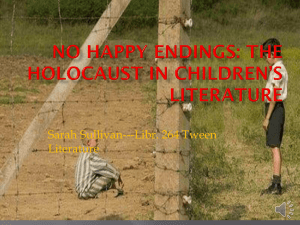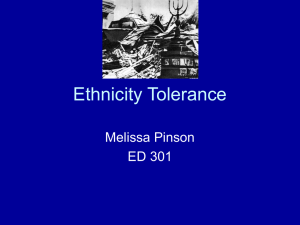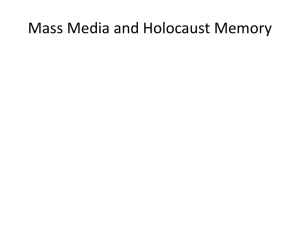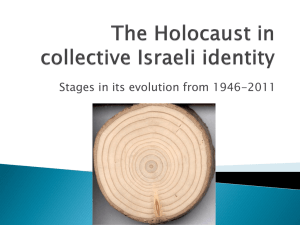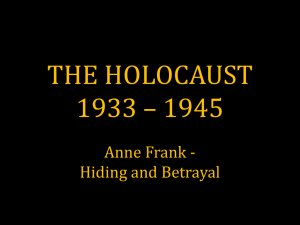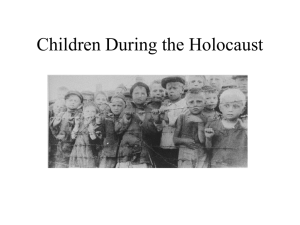Bigotry and The Holocaust: What will you do? Simon Wiesenthal, a
advertisement
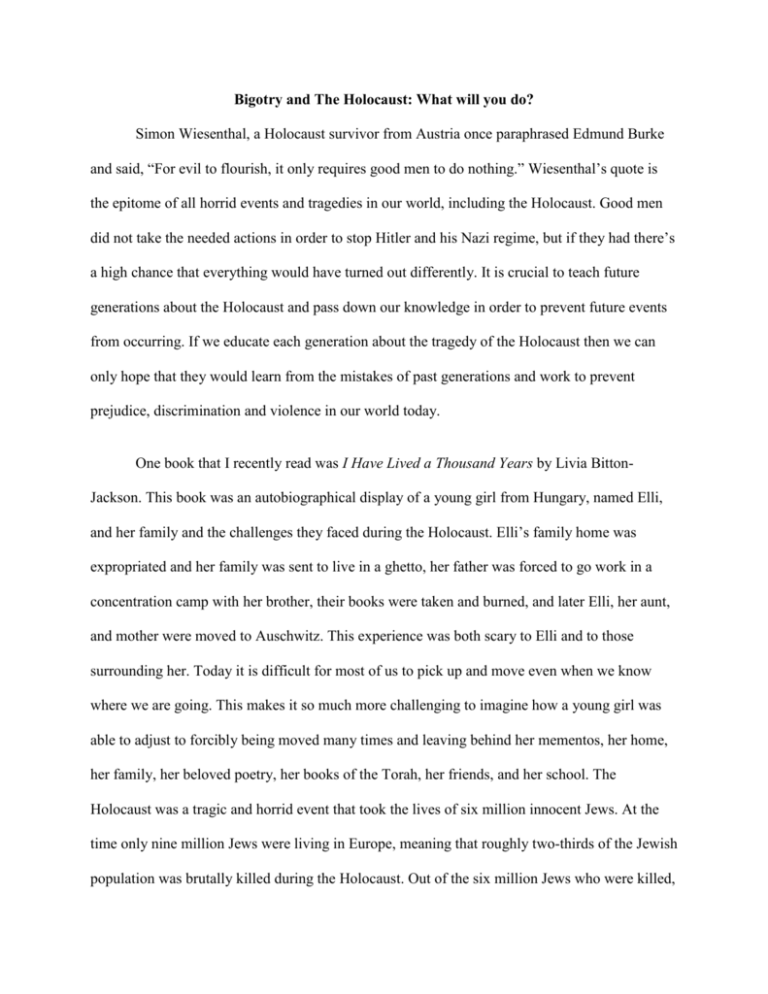
Bigotry and The Holocaust: What will you do? Simon Wiesenthal, a Holocaust survivor from Austria once paraphrased Edmund Burke and said, “For evil to flourish, it only requires good men to do nothing.” Wiesenthal’s quote is the epitome of all horrid events and tragedies in our world, including the Holocaust. Good men did not take the needed actions in order to stop Hitler and his Nazi regime, but if they had there’s a high chance that everything would have turned out differently. It is crucial to teach future generations about the Holocaust and pass down our knowledge in order to prevent future events from occurring. If we educate each generation about the tragedy of the Holocaust then we can only hope that they would learn from the mistakes of past generations and work to prevent prejudice, discrimination and violence in our world today. One book that I recently read was I Have Lived a Thousand Years by Livia BittonJackson. This book was an autobiographical display of a young girl from Hungary, named Elli, and her family and the challenges they faced during the Holocaust. Elli’s family home was expropriated and her family was sent to live in a ghetto, her father was forced to go work in a concentration camp with her brother, their books were taken and burned, and later Elli, her aunt, and mother were moved to Auschwitz. This experience was both scary to Elli and to those surrounding her. Today it is difficult for most of us to pick up and move even when we know where we are going. This makes it so much more challenging to imagine how a young girl was able to adjust to forcibly being moved many times and leaving behind her mementos, her home, her family, her beloved poetry, her books of the Torah, her friends, and her school. The Holocaust was a tragic and horrid event that took the lives of six million innocent Jews. At the time only nine million Jews were living in Europe, meaning that roughly two-thirds of the Jewish population was brutally killed during the Holocaust. Out of the six million Jews who were killed, 1.5 million of them were children. To draw a parallel, there are roughly 5.9 million people living in Maryland which would mean that each and every one of Maryland’s residents would be killed. Another book that I have read was The Diary of Anne Frank. As most of us know Anne Frank was a young girl who ended up dying in the Holocaust. Although she didn’t survive, her diary is a legacy and a living reminder of the challenges people had to face and the abhorrence the Holocaust left behind. Similarly to Elli and her family, Anne Frank and her family were forcibly removed from their home, but before the Franks could be sent to ghettos they were hidden in an annex of a non-Jewish family. The constant fear of being found and taken to concentration camps was overwhelming and it made it an even bigger challenge to survive. Though the Franks were able to remain hidden in the annex for a few years, they were eventually found and sent to concentration camps. Out of the four members of the Frank family, the lone survivor was Anne’s father, Otto Frank. After being released from the concentration camp, Otto Frank found Anne’s diary and later published it. Anne Frank and Elli are both similar because they were young girls forced to adapt to circumstances in order to survive. Now-a-days people look to thrive in their everyday endeavors, not just survive, but during the Holocaust young Jewish girls like Anne and Elli were discriminated against because of their religion, their appearance, their socio-economic class, and their background and the most they could do was to fight for their lives. By teaching future generations about the atrocities of the Holocaust we hope to instill in them a sense of knowledge and awareness so that we can prevent future occurrences. Although, there are many organizations in place today to help prevent prejudice and discrimination, it is still very prevalent in our society and in everyday life. Some common occurrences of prejudice and discrimination in the 21st century include unequal treatment for women, discrimination against the LGBTQ community, prejudice and discrimination against people of color, people of different socio-economic classes, disabled people, and people of different religions. We can help prevent this prejudice and discrimination from blowing into large scale events like the Holocaust by teaching and informing young adults about the horrifying repercussions of this bigotry. Some organizations that students can join include the Diversity Club, IMADR (or The International Movement Against Discrimination and Racism), Equality Now, and UNESCO (of The United Nations Educational, Scientific and Cultural Organization). Organizations like Diversity Club can be found in schools and they help inform students of the different type’s discrimination and prejudice present in our lives today and it focuses on the actions we can take to get rid of this discrimination. For example, this year the Diversity Club at my school is participating in the Day of Silence on April 17, which is in honor of the LGBTQ community and it puts an emphasis on the discrimination the LGBTQ community feels; often times people in the LGBTQ community feel as though no one is listening or giving them a chance to speak. Such organizations are fueled by past events and tragedies like the Holocaust. Just like Simon Wiesenthal said, “For evil to flourish, it only requires good men to do nothing,” for prejudice and discrimination to spread it only requires us to stand by and not take action. By teaching our future generations about the Holocaust we instill in them a sense of responsibility to prevent potential reoccurrences of violence and prejudice. The main lesson we hope to share is that bigotry is dangerous and cruel and any and all actions possible should be taken to prevent it. We wouldn’t want anyone else to feel the oppression that was felt by Anne Frank and Elli and we wouldn’t want anyone to feel as if they can’t be heard, in fact all that we want is to be heard so why take that opportunity away from someone else.
